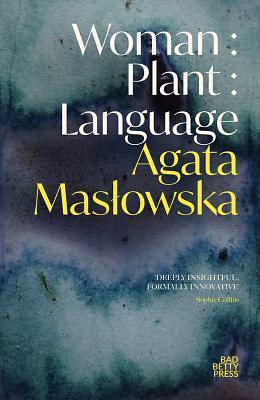Looking for more in Competitions and giveaways?
Book of the Month: Woman : Plant : Language

This October, we are delighted and proud to be able to offer you the chance of winning a copy of Woman : Plant : Language by New Writers Awardee Agata Maslowska, thanks to our friends at Bad Betty Press.
Be in with the chance of winning a copy by answering the question at the bottom of this page by 11.59pm on 31 October 2025.
All entrants must reside in the UK and full terms and conditions apply. Check out our competitions page to find more giveaways.
About Woman : Plant : Language by Agata Maslowska
'Part lullaby, part insurrection', Agata Masłowska’s poetry is powered by the drive to understand life at its deepest level, pre-human and beyond borders. She looks to explode language, grasping what we can know in our bones, and to live according to that knowing. The poems in Woman : Plant : Language disrupt form to challenge authority, layering the lived experiences of womanhood, migration and war with songs of the soil and the calls of endangered species.
Q&A with Agata Maslowska

How did you first get into writing?
I started writing poems in Polish as a child while growing up in Poland. Those early poems had obligatory rhymes as that is what I believed a poem to be and they were mostly about nature and my family. As a teenager I wrote more experimental poems heavily influenced by the music I was listening to and the writers I was obsessed with at the time. When I moved to Scotland I naturally started writing in English, though for many years I was writing fiction rather than poetry. The Covid pandemic changed my writing practice as I couldn’t write nor read fiction at the time, but I could read and write poems. It was an intense period of total immersion in poetry. I would attend online courses, workshops, poetry readings and talks. I started discovering more and more fascinating poets with whom I wanted to have a conversation through my poems.
What can readers expect from Woman : Plant : Language?
This collection brings together poems written mostly in the last five years. The poems explore my main areas of interest which include ecopoetry, migrant literatures, translation, and experimental writing, among others. I think through the parallels between botany and migration and look at migrant experience through the lenses of the natural world and ecology. I like to interrogate language(s) to see what is possible and how words can point beyond their ascribed meanings to create multi-dimensional, polyphonic connections (ecologies?). I am interested in writing a diverse range of poems using different styles, poetic forms and methods, which hopefully comes through in my collection.
How has your time in Scotland influenced your poetry and this collection in particular?
It is hard to answer this question without being somewhat reductive because Scotland has influenced me in so many ways. I wouldn’t have been writing in English if I hadn’t moved to Scotland and met many inspiring people who have urged me to write either directly or indirectly. Scotland offers numerous opportunities for emerging writers. Some of the highlights for me include spending a month writing in a Scottish castle, as part of the Hawthornden Fellowship. Winning the Scottish Book Trust New Writers Award was one of the pivotal moments. Not only was I able to work with a wonderful mentor Sophie Collins as part of the Award, but the ongoing support and encouragement from Scottish Book Trust have been priceless. These and many more opportunities have allowed me to work on my first collection and start sending it out to publishers. It’s one of many reasons why I love living in Scotland.